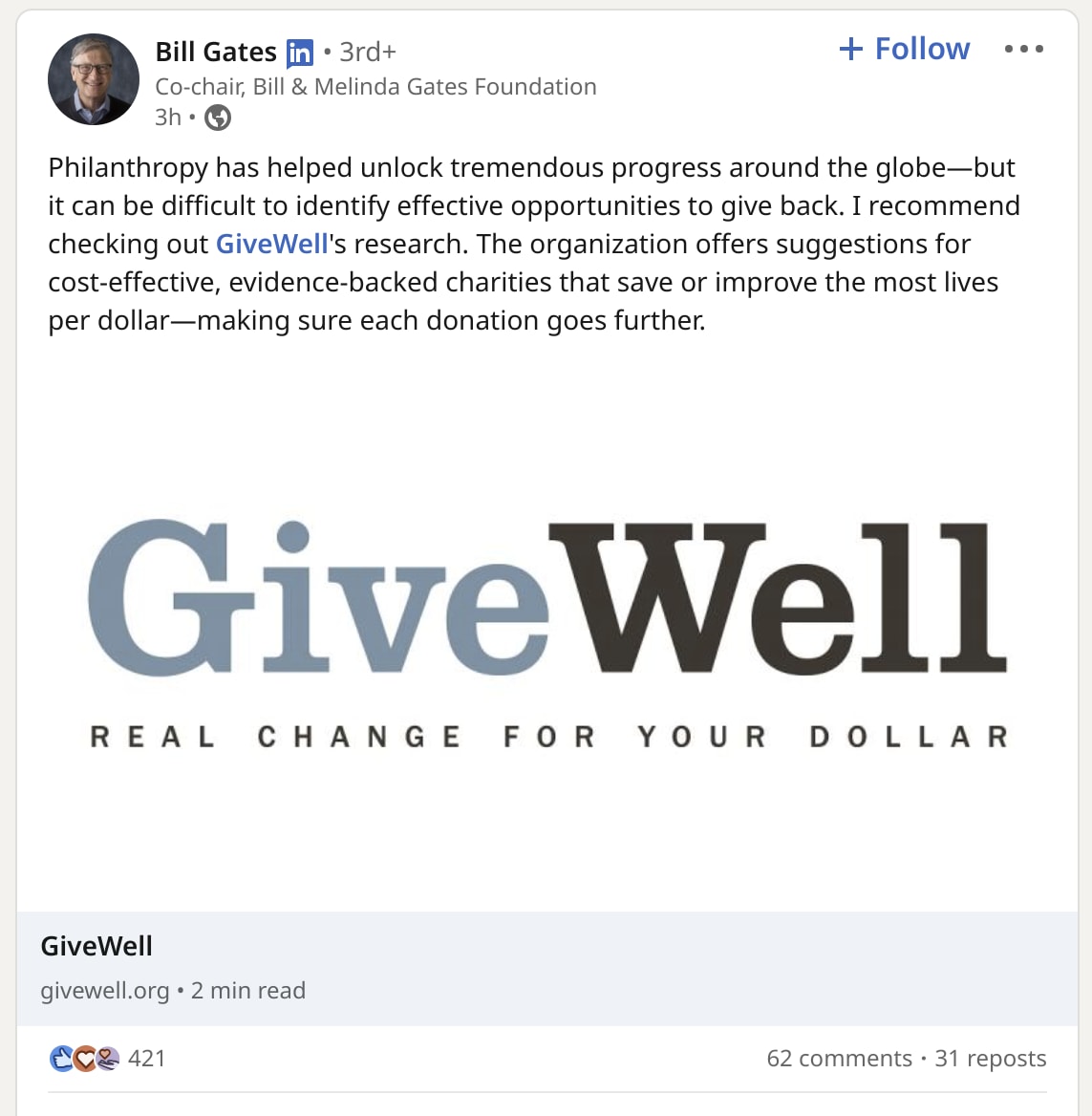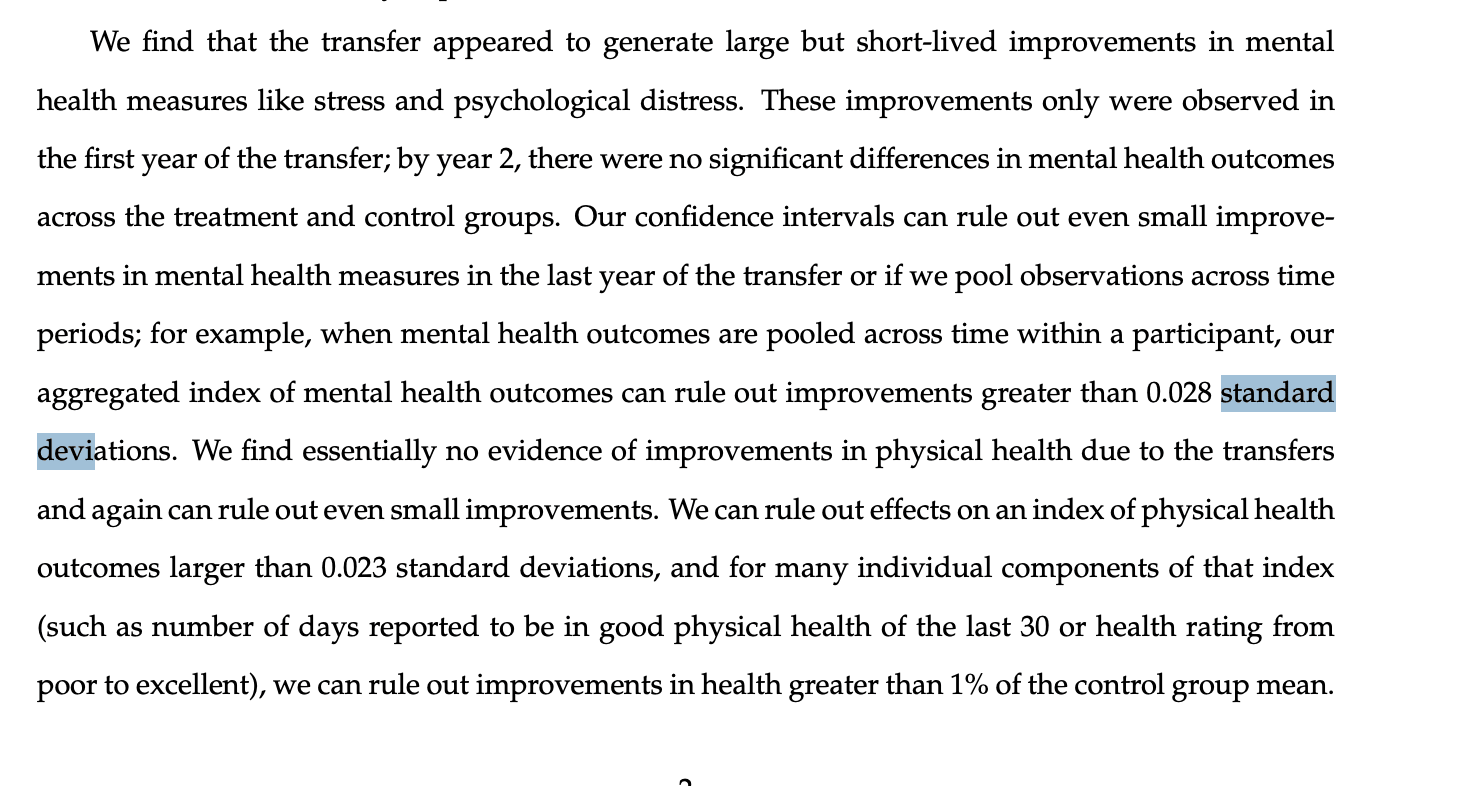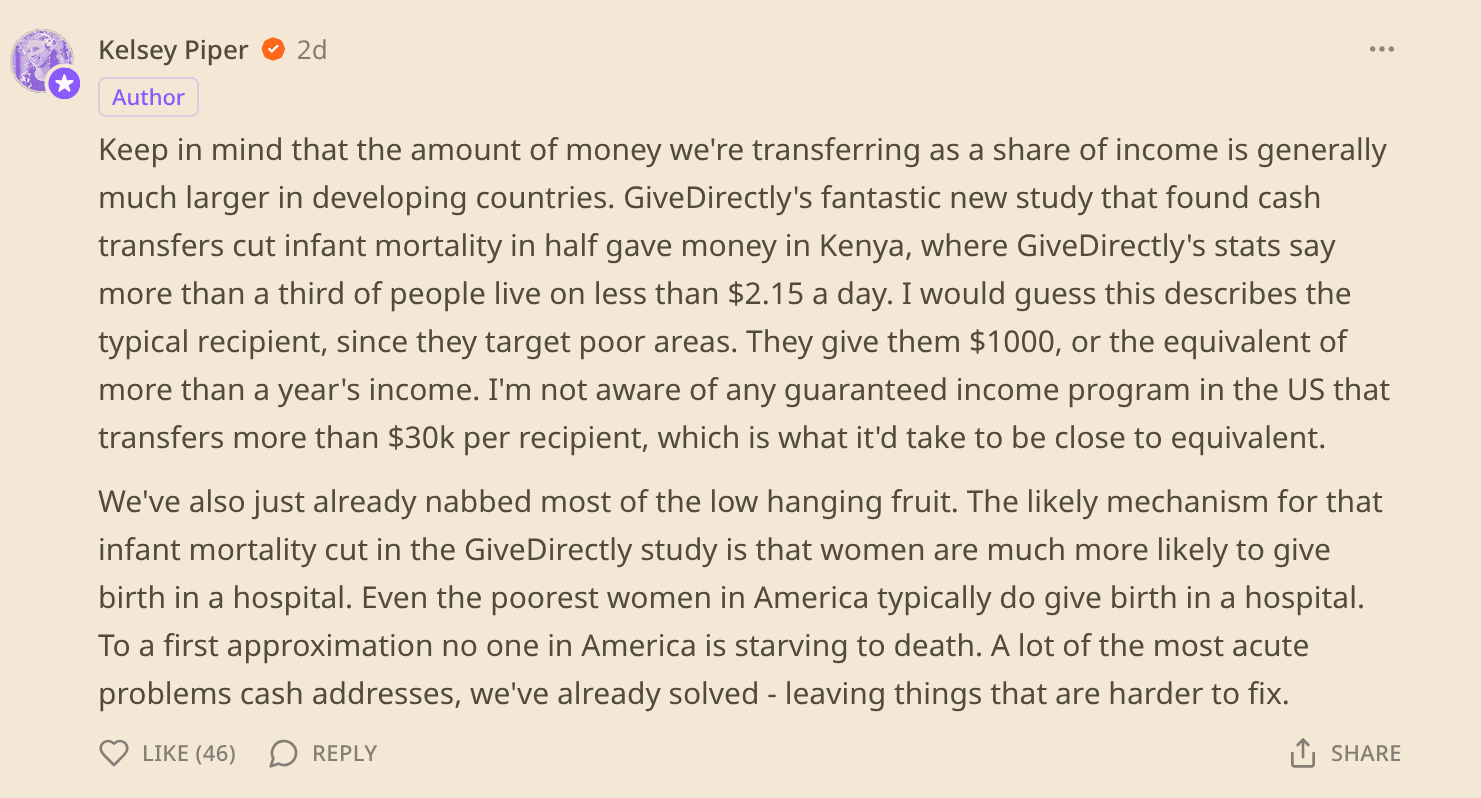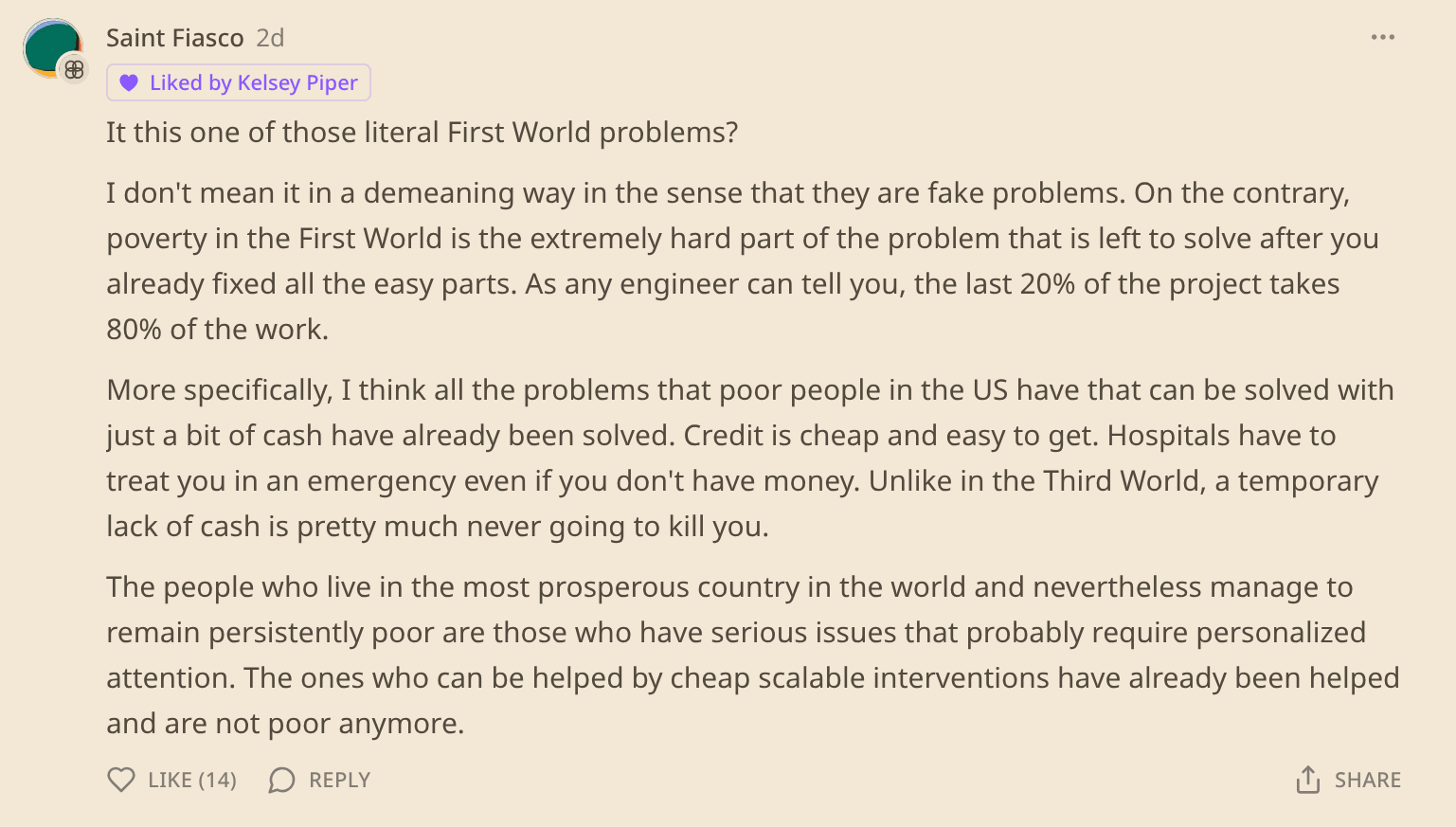Lorenzo Buonanno's Quick takes
By Lorenzo Buonanno🔸 @ 2023-04-04T13:55 (+7)
nullLorenzo Buonanno @ 2023-12-13T21:21 (+123)
Bill Gates just endorsed GiveWell!
I don't know how much we should update on this, but I'm now personally a bit less concerned about the "self-recommending" issues of EA resources being mostly recommended by people in the EA social community.[1]
I think this is a good sign for the effective giving ecosystem, and will make my relatives much less worried about how I spend my money.

- ^
Not that I was super concerned after digging deeper into things in the past year, but I remember being really concerned about it ~2 years ago, and most people don't have that much time to look into things.
Nathan Young @ 2023-12-14T13:28 (+13)
I am confused as to why he doesn't give $1bn a year to GiveWell, but I guess let's wait a year and see if that happens.
Ozzie Gooen @ 2023-12-16T04:16 (+7)
I don't think his foundations really does marketing for donations. My guess is that from his point of view, he thinks it's preferable - but that he thinks GiveWell could be a good fit as a donation target to many audience members.
Luke Freeman @ 2023-12-13T21:24 (+2)
That's fantastic!! Great to see, thanks for sharing!
Lorenzo Buonanno🔸 @ 2025-10-13T12:15 (+36)
Reposting this comment from the CEO of Open Philanthropy 12 days ago, as I think some people missed it:
A quick update on this: Good Ventures is now open to supporting work that Open Phil recommends on digital minds/AI moral patienthood. We're still figuring out where that work should slot in (including whether we’d open a public call for applications) and will update people working in the field when we do. Additionally, Good Ventures are now open to considering a wider range of recommendations in right-of-center AI policy and a couple other smaller areas (e.g. in macrostrategy/futurism), though those will be evaluated on a case-by-case basis for now. We’ll hopefully develop clearer parameters for GV interest over time (and share more when we have those). In practice, given our increasing work with other donors, we don’t think any of this is a huge update; we’d like to continue to hear about and expect to be able to direct funding to the most promising opportunities whether or not they are a fit for Good Ventures.
Lorenzo Buonanno @ 2023-04-04T13:55 (+35)
Postmortem on mod action on the April fools post “A modest proposal for women in EA”
Summary
Last Sunday, a bad post (definitely violating multiple forum norms) from a new anonymous user was published on the Forum. It got a lot of views and we removed it 11 hours and 30 minutes after it went up. I think we made some mistakes and wanted to write a quick postmortem.
Timeline (all times are Sunday April 2, 2023 and in CEST, although the mod team is in different timezones):
| 10:49 AM | The post “A modest proposal for women in EA” from a new user “ozaiscometh” goes up |
| 1:03 PM | I notice the first user report on the forum, "maybe this is well intentioned satire, but it misses on the rather sensitive issue of sexual assault", and start a discussion in the moderation Slack |
| 1:57 PM | I notice a second user report on the forum |
| 4:56 PM | JP proposes banning ozaiscometh for the post |
| 9:47 PM | We notice a lot of other reports (~6 from memory). We notice that the post (despite being heavily downvoted) is getting a lot more views than expected (~190 at the time) |
| 9:55 PM | A user suggests deleting the post in a comment |
| 10:06 PM | We ban ozaiscometh, and post a comment mentioning that |
| 10:18 PM | We remove the post |
Key mistake: I allowed the post to be visible on the Forum
I read it as a bad taste (satirical) criticism arguing something like "EA doesn't listen to my reports on sexual assault", which in hindsight is also not ok written like that, but I was worried about censoring criticism and didn’t examine enough whether it was just straightforwardly norm-violating. I didn’t realize other readers might interpret it very differently and didn’t consider enough how sensitive the topic is.
We currently approve almost all new users, except in extreme cases (e.g. spam, calls to violence, etc.). Our general approach is to let karma take care of hiding low-quality content, and actively remove content very rarely.
Learnings
- Before approving users whose first post/comment is dubious or in bad taste, I’ll default to double-checking with other moderators.
- The moderation team is not synched up on which posts to approve, or our criteria for approving posts are wrong
- We’ll think more about this in the future.
Other considerations
- The post went up on a Sunday morning and was removed less than 12 hours later. The offender was banned at the same time. Overall, we think this is an ok response time, especially given that the post was so downvoted that it was not showing up for people who weren't actively looking for it (at least 84% of views came from Twitter, and we think that many were after the post was removed).
- We think the karma system did its job. The post was at -185 karma with 55 downvotes less than 12 hours after it was posted. If I remember correctly, it was at -10 karma after less than 10 minutes.
- I’m particularly grateful to the (many) users who reported the post on the Forum.
- We’re doing a quick check to see if this account is an alt of another user.
Edit: the forum team checked and there is no other user using the same IP address.
Larks @ 2023-04-04T19:13 (+15)
I read it as a bad taste (satirical) criticism arguing something like "EA doesn't listen to my reports on sexual assault", which in hindsight is also not ok written like that, but I was worried about censoring criticism and didn’t examine enough whether it was just straightforwardly norm-violating.
I think this is a reasonable class of concerns for you to have had; there has been a lot of media criticism of schools and libraries for removing offensive books about sex or violence, including satire, though this post does seem to have been unusually bad. It seems like you guys have been focused on making sure the forum works well for people engaging with it organically, where as you pointed out the karma system worked well. People on twitter selectively highlighting content that would not be visible to ordinary users is a very different threat model that seems both less crucial and harder to address.
pseudonym @ 2023-04-04T19:17 (+4)
I agree that this is a reasonable class of concerns to have in general, and I agree that moderators probably shouldn't optimize for the threat of people selectively highlighting content, though it does seem to be stretching the bounds of charitability for this specific post to count as a good-faith criticism/satire.
Chris Leong @ 2023-04-04T18:44 (+4)
If the issue was that the post was left up longer than you feel it should have been left up in retrospect due to deliberation time, then I'd suggest adding a feature to temporarily remove a post. This would be similar to deleting and undeleting a post except that it would show a message saying that the post is currently under mod consideration.
I would generally hate to see situations where mods feel like they have to rush a decision as I suspect that this would lead to worse decisions.
Lorenzo Buonanno @ 2023-04-04T18:57 (+2)
Thanks for the suggestion.
There is already a similar feature (we moved the post to the user's drafts, and could theoretically undraft it), but it doesn't show a special message.
I personally think that the response time, ~12 hours on a Sunday, was ok (but I might be wrong on this) and that the key mistake was allowing the post in the first place.
pseudonym @ 2023-04-04T19:07 (+4)
(Didn't see this chain when I commented below, sorry!)
I agree 12 hours on a Sunday does seem reasonable and the main decision to let the post through seems less reasonable. I do think that whatever extent you expect to be less active with moderating decisions on a weekend, the bar for allowing the post should probably be higher as a result. I do recognize this was probably made much more difficult with April Fool's though, thanks for all the work you do for the forum!
pseudonym @ 2023-04-04T19:04 (+2)
Thanks for this postmortem.
I didn't see the post when it first came up, so I agree the karma system was working well. There might be some hindsight bias here, but I think the post clearly seemed to fall within what I would have hoped the mod check would screen out.
I also think another commentor's suggestion in the original post about deanonymizing the main account of this user, if one exists, is also worth considering given how clearly egregious and malicious this post was. I'd also be happy for this person to not be at future EAGs or CEA-organized events, especially given the caliber of people I have met in EA spaces who have missed out.
Lorenzo Buonanno @ 2023-04-04T19:35 (+1)
deanonymizing the main account of this user, if one exists, is also worth considering given how clearly egregious and malicious this post was.
Added an update to the end of the postmortem, the forum team checked and there is no other user using the same IP address.
There might be some hindsight bias here, but I think the post clearly seemed to fall within what I would have hoped the mod check would screen out.
Agree, it was a mistake.
Lorenzo Buonanno🔸 @ 2025-08-20T21:16 (+10)
Kelsey Piper wrote a nice article on recent results of cash transfers in the US: Giving people money helped less than I thought it would
If you give a new mom [in the US] a few hundred dollars a month or a homeless man one thousand dollars a month, that's gotta show up in the data, right?
Alas.
A few years back we got really serious about studying cash transfers, and rigorous research began in cities all across America. Some programs targeted the homeless, some new mothers and some families living beneath the poverty line. The goal was to figure out whether sizable monthly payments help people lead better lives, get better educations and jobs, care more for their children and achieve better health outcomes.
Many of the studies are still ongoing, but, at this point, the results aren’t “uncertain.” They’re pretty consistent and very weird. Multiple large, high-quality randomized studies are finding that guaranteed income transfers do not appear to produce sustained improvements in mental health, stress levels, physical health, child development outcomes or employment. Treated participants do work a little less, but shockingly, this doesn’t correspond with either lower stress levels or higher overall reported life satisfaction.
Homeless people, new mothers and low-income Americans all over the country received thousands of dollars. And it's practically invisible in the data. On so many important metrics, these people are statistically indistinguishable from those who did not receive this aid.
I cannot stress how shocking I find this and I want to be clear that this is not “we got some weak counterevidence.” These are careful, well-conducted studies. They are large enough to rule out even small positive effects and they are all very similar. This is an amount of evidence that in almost any other context we’d consider definitive.
[...]
Overall, the larger and more credible studies in this space have tended to find worse effects.
While it's sad that the lives of people in those studies didn't improve, I think this is some evidence that Giving isn’t demanding, and that giving 10% wouldn't worsen the life of a median person in the US in a measurable way.
Linch @ 2025-08-21T21:03 (+6)
I expected low effects based on background assumptions like utility being sublogarithmic to income but I didn't expect the effect to be actually zero (at the level of power that the very big studies could detect).
I'd be interested in replicating these trials in other developed countries. It could just be because the US is unusually wealthy.
Of course, like you say, this is further evidence we should increase foreign aid, since money could do far more good in very poor countries than very rich ones.
Lorenzo Buonanno🔸 @ 2025-08-21T22:53 (+4)
I haven't run the numbers, and this is not my field so the below is very low confidence, but now that you mention it I wouldn't be surprised if isoelastic utility would be enough to explain the lack of results.
LLMs claim that if the effect size is 10 times smaller, you need a sample size 100x larger to have the same statistical significance (someone correct me if this is wrong)
So if a GiveDirectly RCT in Kenya needs a sample size of 2,000 individuals to detect a statistically significant effect; an RCT in the US where you expect the effect to be 10x smaller would need 200,000 individuals, which is intractable[1].
Another intuition is that the effects of cash transfers in LMIC are significant but not huge, and iirc many experts claim that after ~5 years from the transfer there are negligible effects on subjective well-being, so it wouldn't take that much for the effect to become undetectable.
But again, this is all an uninformed vague guess.
- ^
Edit: Gemini raises a good point that variance could also be higher in the US. If the standard deviation of wellbeing for beneficiaries in the US is 2x larger than in Kenya, and the effect is 10x smaller, I think you'd need a 400x larger sample size, not "just" 100x
Linch @ 2025-08-22T01:22 (+13)
Hmm, I'd guess the s.d.s to be lower in the US than in Kenya, for what it's worth. Under five child mortality rates are about 10x higher in Kenya than in the US, and I expect stuff like that to bleed through to other places.
But even if we assume a smaller s.d. (check: is there a smaller s.d., empirically?), this might be a major problem. The top paper on OpenResearch says they can rule out health improvements greater than 0.023-0.028 standard deviations from giving $1000/month. I'm not sure how it compares to households incomes, but let's assume that household income is $2000-$3000/month for the US recipients now, so the transfer is 33-50% of household income.

From Googling around, the GiveDirectly studies show mental health effects around a quarter of a standard deviation from a doubling of income.
In other words, the study can rule out effect sizes the size that theory would predict if theory predicts effect sizes >0.1x the effect size in GiveDirectly experiments.
Does theory predict effect sizes >0.1x that of the GiveDirectly experiments? Well, it depends on ň, the risk-aversion constant[1]! If risk aversion is between 0 (linear, aka insane) and 1 (logarithmic) we should predict changes >.41 x to >.58x that of the GD experiments. So we can rule out linera, logarithmic, and super-logarithmic utility!
But if ň=1.5, then theory will predict changes on the scale of 0.076x to 0.128x that of the GD experiments. Ie, exactly in the boundary of whether it's possible to detect an effect at all or not!
If ň =2, then theory will predict changes on the scale of 0.014x to 0.028x, or much smaller than the experiments are powered to detect.
For what it's worth, before the studies I would've guessed a risk-aversion constant across countries to be something in between 1.2 and 2, so this study updates me some but not a lot.
@Kelsey Piper and others, did you or the study authors pre-register your beliefs on what risk-aversion constant you expected?
- ^
rendering the greek constant economists use for risk aversion
as ň since it otherwise doesn't render correctly on my laptop.
Mo Putera @ 2025-08-22T08:16 (+6)
But if ň=1.5, then theory will predict changes on the scale of 0.076x to 0.128x that of the GD experiments. Ie, exactly in the boundary of whether it's possible to detect an effect at all or not!
Might be misreading, on a quick skim Sam Nolan's analysis seemed pertinent but noticed you'd already commented. Sam's reply still seems useful to me, in particular the data here
In London, it was found to be 1.5, in 20 OECD countries, it was found to be about 1.4. James Snowden assumes 1.59.
although none of those countries are low-income so your concern re: OOD generalisation still applies.
Linch @ 2025-08-22T08:29 (+4)
lmao when I commented 3 years ago I said
As is often the case with social science research, we should be skeptical of out-of-country and out-of-distribution generalizability.
and then I just did an out-of-country and out-of-distribution generalization with no caveats! I could be really silly sometimes lol.
Lorenzo Buonanno🔸 @ 2025-08-22T07:06 (+4)
Thank you for running the numbers!
I'm not sure about using these results to update your estimates of ň (as there are too many other differences between the US and LMICs, e.g. access to hospitals, no tubercolosis). But it does seem that reasonable values of ň would explain most of the lack of effects, especially for the study where mothers received "just" $333/month and similar ones.
Toby Tremlett🔹 @ 2025-08-21T08:20 (+6)
Maybe it was just the titling of the essay - but I was surprised when I read it to see no mention of giving a la givedirectly (i.e. to people in extreme poverty). I take it that these results don't imply much of an update there? Am I wrong?
Lorenzo Buonanno🔸 @ 2025-08-21T13:31 (+6)
I think these studies are just more evidence on the difference between US poverty and global poverty.
Some comments from the post:



Lorenzo Buonanno🔸 @ 2025-07-24T22:56 (+4)
From https://arxiv.org/pdf/1712.03079
Suppose some future technology enables the same consciously experienced human life to be repeated, identically or nearly so, N times, in series or in parallel. Is this roughly N times as valuable as enabling the same life once, because each life has value and values are additive? Or is it of roughly equal value as enabling the life once, because only one life is enabled, albeit in a physically unusual way? Does it matter whether the lives are contemporaneous or successive? We argue that these questions highlight a hitherto neglected facet of population ethics that may become relevant in the not necessarily far distant future.
[...]
the intuition behind replication futility is that, having written Alice’s life into the universe once, we add nothing to the total value of the universe (integrated over space and time) by doing so again. In particular, we add no value for Alice by repeating her emulation, even though each emulation of Alice has the sense of appreciating their life.
I remember reading something similar on this a while ago, possibly on this forum, but I can't find anything at the moment, does anyone remember any other papers/posts on the topic?
Will Aldred @ 2025-07-24T23:13 (+4)
There’s an old (2006) Bostrom paper on ~this topic, as well as Yudkowsky’s ‘Anthropic Trilemma’ (2009) and Wei Dai’s ‘Moral Status of Independent Identical Copies’ (2009). Perhaps you’re remembering one of them?
(Bostrom disagrees with the second paragraph you cite, as far as I can tell. He writes: ‘If a brain is duplicated so that there are two brains in identical states, are there then two numerically distinct phenomenal experiences or only one? There are two, I argue.’)